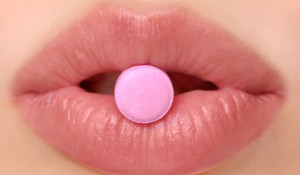This post is part of a series of guest posts on GPS by the graduate students in my Psychopathology course. As part of their work for the course, each student had to demonstrate mastery of the skill of “Educating the Public about Mental Health.” To that end, each student has to prepare two 1,000ish word posts on a particular class of mental disorders.
______________________________________________
The Spectrum of Female Sexual Desire by Kelly Cowan
 This world is comprised of a massively wide range of individuals. This variation can be seen in how people talk, how they dress, their sense of style, their tastes in food, the climate they prefer to live in, and even their level of sexual desire. Furthermore, our tastes evolve as we grow and experience changes in life, and it only makes sense that our sexual desire will also go through drastically different stages throughout our lifespan. The concept of variations in ones sexual desire is not new. It has been a subject for fine art, research, documentaries, and countless home remedies for those times when the valleys are too low, or possibly, when the peaks are too high. It is no surprise that there have been a myriad of pharmaceutical interventions in this area as well. However, should we really be altering, or enhancing, something that is part of a natural cycle, or progression in life? In addition, if we are going to mess with nature, how do know when what we are experiencing is a passing phase, or when is time for an intervention?
This world is comprised of a massively wide range of individuals. This variation can be seen in how people talk, how they dress, their sense of style, their tastes in food, the climate they prefer to live in, and even their level of sexual desire. Furthermore, our tastes evolve as we grow and experience changes in life, and it only makes sense that our sexual desire will also go through drastically different stages throughout our lifespan. The concept of variations in ones sexual desire is not new. It has been a subject for fine art, research, documentaries, and countless home remedies for those times when the valleys are too low, or possibly, when the peaks are too high. It is no surprise that there have been a myriad of pharmaceutical interventions in this area as well. However, should we really be altering, or enhancing, something that is part of a natural cycle, or progression in life? In addition, if we are going to mess with nature, how do know when what we are experiencing is a passing phase, or when is time for an intervention?
One reason that it has been difficult for pharmaceutical companies to find a possible treatment is because of the many influences that play a role in arousal, and ultimately orgasm. Arousal is extremely intertwined with not only hormone levels, but also relationship difficulties, self-esteem, or any other life stressor. Additionally, because hormone levels change throughout a woman’s menstrual cycle, these levels are greatly variable, and can affect a persons desire for sexual intimacy. There are also major changes in sexual desire levels throughout the lifespan. Furthermore, cultural beliefs are strongly entrenched in a person’s moral compass regarding what is right, and what is wrong, for them to be participating in, feeling, and doing. If one were to add in potentially restrictive religious beliefs to the mix of influencing factors regarding sexuality, it is easy to understand why some people may have a lower libido than others may. But…does that make them disordered?
Looking more long term than a monthly cycle, there tend to be natural variations in our sexual desires as we age as well. Someone who is 20 will more than likely have a much greater sex drive than someone who is 55 does. However, the opposite could true for someone else. Some individuals may experience a more enthusiastic sex life later in life. There could be many reasons for this, and the key thing to remember is that these fluxuations vary from one individual to the other, and one treatment will not work for everyone because there are more factors to consider than just an issue of blood flow. There is no feasible way to determine how much sex is too little or not through definition alone.
Could it be possible that rather than looking for a medicinal treatment to cure someone’s low sex drive, or an inability to achieve orgasm, efforts should be more focused on sexual skills training for individuals and couples. That would probably be more fun, and more beneficial, than simply taking a pill, or wearing a testosterone patch anyway. It seems as though people have forgotten that their actions are able to affect their sex lives. As a culture, it is all too easy to simply get a prescription for a pill to do the hard work for us. We take pills to lower blood pressure, and while there is a place for that, there are also methods that could help with blood pressure that actually involve the individual, such as diet, exercise and relaxation techniques. Nevertheless, time after time we go for the pill. If we could learn to read our bodies, and gain a greater understanding of what we need or want, especially sexually, there may not be a need for a pill to raise your libido. Additionally, if people were able to communicate more easily about their intimacy needs, maybe communication would be improved enough that there would be less misunderstandings, less divorce, and greater peace in the world. This may lead to more time for sex.
 Don’t get me wrong. I am all about equal opportunity availability of a treatment that will increase sexual desire. If there is a little blue pill, there should be a little pink pill. Unfortunately, the search for something that works to boost a woman’s libido is not yet available. Moreover, the search has been on going for over a decade. The concept of female sexual dysfunction only came about after Viagra came out, and the drug companies wanted to develop a similar medication for women. Additionally, in order for the FDA to approve a new medication, there has to be a need for it. Voila, female sexual dysfunction! While some women would definitely benefit from something to boost their libido, there is also a dangerous side of yet another form of advertisement telling women they are not good enough, not sexy enough, not young enough, and not virile enough. This pressure alone could be a culprit in someone not even wanting to bother with sex. After enough time passes of feeling that way, it is hard to get those old feelings back.
Don’t get me wrong. I am all about equal opportunity availability of a treatment that will increase sexual desire. If there is a little blue pill, there should be a little pink pill. Unfortunately, the search for something that works to boost a woman’s libido is not yet available. Moreover, the search has been on going for over a decade. The concept of female sexual dysfunction only came about after Viagra came out, and the drug companies wanted to develop a similar medication for women. Additionally, in order for the FDA to approve a new medication, there has to be a need for it. Voila, female sexual dysfunction! While some women would definitely benefit from something to boost their libido, there is also a dangerous side of yet another form of advertisement telling women they are not good enough, not sexy enough, not young enough, and not virile enough. This pressure alone could be a culprit in someone not even wanting to bother with sex. After enough time passes of feeling that way, it is hard to get those old feelings back.
So, what do we do to help? One possible solution would be to educate people about the natural occurring cycles in life. That there will be lows, and there will be highs. Sometimes in life, increasing sexual technique training in couples counseling, and even in individual counseling. Some people may not even know how to make themselves feel good, partly because we are so used to taking a pill instead of working on it ourselves. Above all else, making sure that someone knows that just because they do not want to screw does not make them disordered.
